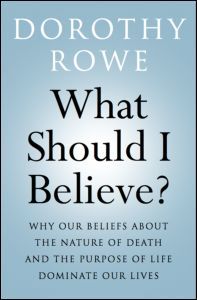What Should I Believe? Why Our Beliefs about the Nature of Death and the Purpose of Life Dominate Our Lives

Suddenly, in the twenty-first century, religion has become a political power. It affects us all, whether we?re religious or not. If we?re not in danger of being blown up by a suicide bomber we?ve got leaders to whom God speaks, ordering them to start a war. We?re beset by people who demand that we give ourselves to Jesus while they smugly assure us of their own superiority and inherent goodness. We?re surrounded by those who noisily reject science while making full use of the benefits science brings; by the ?spiritual? ones; the ones who believe in magic; and there?s the militant atheists berating us all for our stupidity. We wouldn?t object to what people believed if only they?d keep it to themselves. We want to make up our own minds about what we believe, but it?s difficult to do this. Everyone has to face the dilemma that we all die but no one knows for certain what death actually is. Is it the end of our identity or a doorway to another life? Whichever we choose, our choice is a fantasy that determines the purpose of our life. If death is the end of our identity, we have to make this life satisfactory, whatever ?satisfactory? might mean to us. If it is a doorway to another life, what are the standards we have to reach to go to that better life? All religions promise to overcome death, but there?s no set of religious or philosophical beliefs that ensures that our life is always happy and secure. Moreover, for many of us, what we were taught about a religion severely diminished our self-confidence and left us with a constant debilitating feeling of guilt and shame.
Through all this turmoil comes the calm, clear voice of eminent psychologist Dorothy Rowe. She separates the political from the personal, the power-seeking from the compassionate. She shows how, if we use our beliefs as a defence against our feelings of worthlessness, we feel compelled to force our beliefs on to other people by coercion or aggression. However, it is possible to create a set of beliefs, expressed in the religious or philosophical metaphors most meaningful to us, which allow us to live at peace with ourselves and other people, to feel strong in ourselves without having to remain a child forever dependent on some supernatural power, and to face life with courage and optimism.
Religion in the Twenty-first Century. What it is to Be Human. ‘Hemmed in a Cirque of Our Own Creating’. Very Different Points of View. Being Good and the Just World. Trying to Be Good. How We Acquire Our Beliefs. The Consequences of Our Beliefs.
Dorothy Rowe is a psychologist and author of 13 books, including the worldwide best seller Depression: The Way Out of Your Prison. She is Australian and divides her time between London and Sydney.
Date de parution : 10-2008
12.9x19.8 cm
Date de parution : 09-2016
12.9x19.8 cm
Thèmes de What Should I Believe? :
Mots-clés :
kerry; packer; celtic; background; god's; chosen; people; religious; belief; forces; Young Man; Evangelical Baptist Church; Anti-psychotic Drugs; Cancer Research UK; Brian Houston; Human Suffering; St Andrew’s Cathedral; St Andrew’s Church; Bellevue Hill; Tragic Flaw; St John’s Hospital; Celebrate St Patrick’s Day; Red Mist; Beautiful Lies; Kerry Packer; Unseen Order; St Patrick’s Day; Bland Person; Orderly Train; Christian Church; DNA Code; Fossil Genes; Transpersonal Psychology; Global Anglican Future Conference; Religious Experience Research Unit



